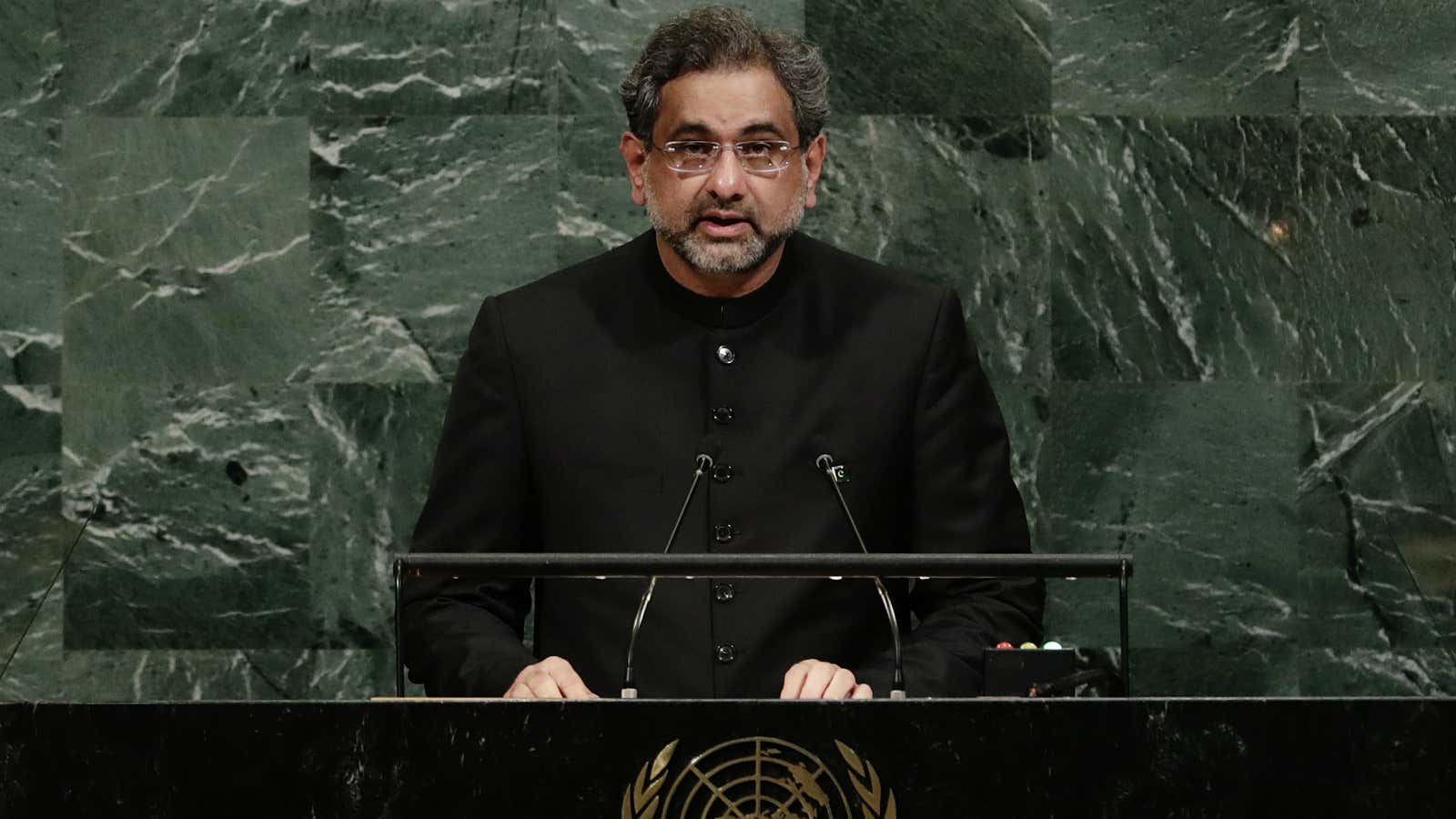United Nations, New York
It took Pakistan’s prime minister Shahid Khaqan Abbasi all of three minutes to first mention Jammu & Kashmir (J&K) in his address to the United Nations General Assembly (UNGA) late on Sept. 21.
“The legitimate struggle for self-determination of the people of Jammu & Kashmir continues to be brutally suppressed by India’s occupation forces,” said Abbasi, who took office only last month following the disqualification of his predecessor, Nawaz Sharif, by Pakistan’s supreme court.
Making his debut on the global diplomatic stage, Abbasi kept it along expected lines: laying into India on the vexed Kashmir dispute and showering affection on China on account of the growing economic engagement between the two countries.
That Kashmir was once again brought up at the UN, some 69 years after the issue was first raised, is no surprise. Last week, Pakistan’s ambassador to the UN had told Quartz this was coming, especially with the bilateral dialogue between the two countries stalled since 2016.
Analysts, too, had predicted it. “While we can assume that every permanent member of the UN Security Council, including China, would like Pakistan to address the terror issue in its address to the general assembly, we can instead expect a rehashing of the Kashmir narrative,” Michael Kugelman, senior associate for south Asia at Washington DC’s Woodrow Wilson Centre, had said last week. “It’s like a broken record, and completely predictable.”
After the first mention of Kashmir, though, Abbasi took some eight minutes to up the ante. Dressed in a black sherwani and a white salwar, the Pakistani prime minister accused New Delhi of war crimes in Kashmir.
“Pakistan demands an international investigation into India’s crimes in Kashmir,” he said. “We ask that the United Nations secretary-general and the high commissioner for human rights send an inquiry commission to occupied Kashmir to verify the nature and extent of India’s human rights violations, secure the punishment of those responsible, and provide justice and relief to the victims.”
To be sure, the Narendra Modi government’s handling for situation in Kashmir has been under scrutiny for some time now. In particular, the use of pellet guns to quell public protests in the Kashmir valley since last summer has blinded scores, injured hundreds, and drawn international condemnation.
Abbasi urged the UN secretary-general, Antonio Guterres, to appoint a special envoy on Kashmir to help the UN Security Council implement its resolutions, passed over half-a-century ago. A key resolution, passed on 21 April, 1948, calls for a free and impartial plebiscite in J&K, but imposes certain preconditions on both countries, including troop withdrawals. These prerequisites haven’t been fulfilled by either side, with India steadfast in terming the issue bilateral.
There has been no bilateral engagement between the two nuclear-armed neighbours since an attack on an Indian airbase last year, purportedly by Pakistan-based terrorists. New Delhi has maintained that it won’t come to the table unless Islamabad stops backing terror groups operating within its territory.
For a moment at the UNGA, though, it seemed Abbasi would extend a cautious hand. “Pakistan remains open to resuming a comprehensive dialogue with India to address all outstanding issues, especially Kashmir,” he said.
But that wasn’t to be.
In his next sentence, the prime minister accused India of “state-sponsored terrorism, campaign of subversion, and state sponsored terrorism against Pakistan, including from across our western border”— a clear reference to the restive Balochistan where Islamabad is fighting an insurgency.
And although Abbasi’s flat tone remained throughout, the warmth of his words decidedly altered as he spoke of China. Beijing’s ultra-ambitious One Belt One Road (OBOR) initiative received special mention, as he emphasised that the modern-day recreation of the ancient Silk Route would boost Pakistan’s economy. “The vision of shared growth, spelt out in Chinese president Xi Jinping’s Belt and Road initiative, offers a solid path to prosperity and a model of south-south cooperation worthy of emulation,” Abbasi said.
The China-Pakistan Economic Corridor, an offshoot of the OBOR project, also made an appearance. Abbasi insisted that, in spite of significant local resentment, the $62 billion corridor featuring large Chinese companies will help drive an economic revival in Pakistan. “This (economic upsurge) will expand exponentially as the Pakistan-China partnership extends beyond energy and transportation to many other sectors,” he said.
In the end, it was 20 minutes of predictability, with a large serving of vitriol.
Update: Later on, India replied to Abbasi’s speech. Eenam Gambhir, the first secretary at India’s UN mission, said:
In its short history, Pakistan is a geography synonymous with terror. The quest for a land of pure has actually produced “the land of pure terror.” Pakistan is now ‘”Terroristan” with a flourishing industry producing and exporting global terrorism.
